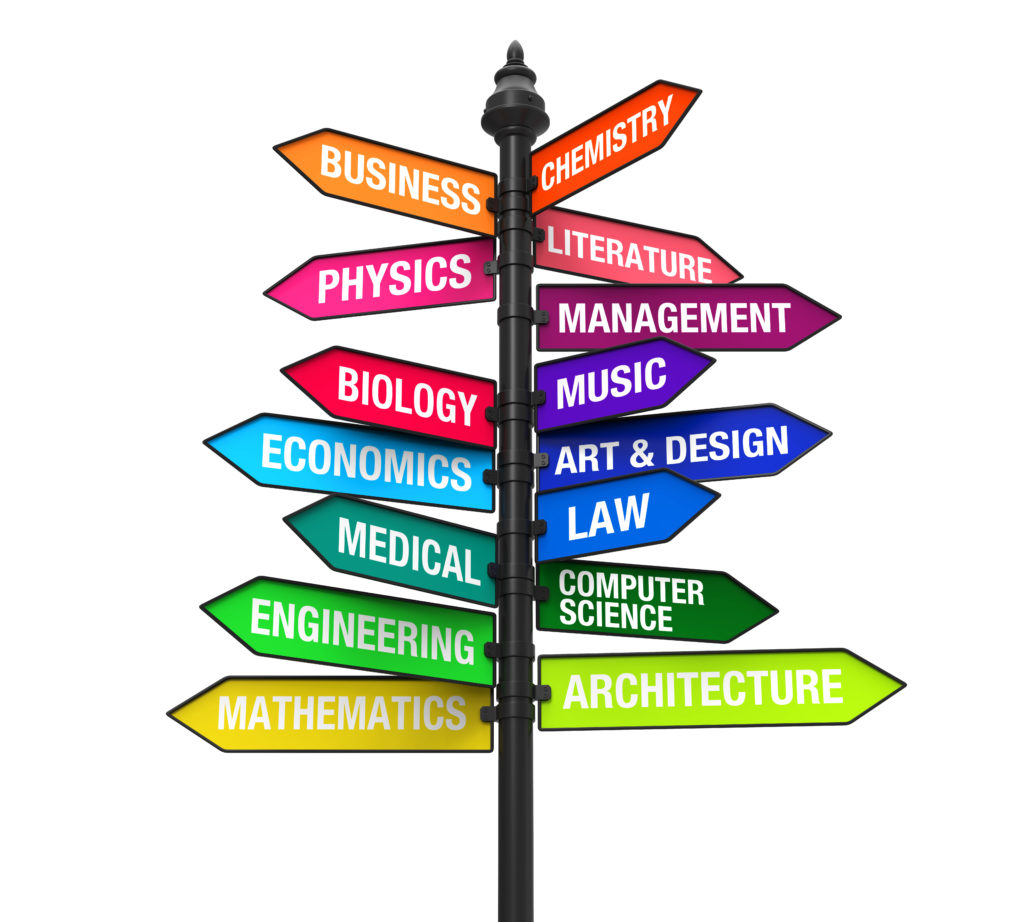
Education is essential for everyone. You should consider what is the best educational pathway for your intended career. Not all careers need college degrees, but most high-paying professions do, including:
- Accounting
- Law
- Medicine
Professions like these need a major in their respective disciplines.
But many entry-level positions do not need extensive training. In fact, many people begin their careers with the least educational requirements. Also, many people select minor degrees that will complement their major degrees.
To be successful, you should decide which educational pathway is best for you. And this article can help.
Have you ever asked yourself, is a minor the same as an associates degree? Does a minor count as a degree? What is the difference between a major and a minor? If so, read on to find the answers to your questions.
–>
Determining the Curriculum
Each institution of higher learning determines the requirements for its bachelor’s degree programs. Many primary field areas, such as nursing and other medical professions, look for certified practitioners. Also, various accrediting agencies determine some of the requirements. The U.S. Department of Education does as well.
Academic departments must offer certain courses with a certain number of class hours. If they do not meet this rule, they do not receive accreditation. Also, some disciplines need hands-on experience at:
- Clinics
- Local hospitals
- Other facilities
Major vs Minor Degree
What is the difference in major and minor degrees? What is a major and minor, and what sets them apart from each other? How does a double major differ from a minor?
Read on to learn what the major degree and minor degree meaning is.
- Major Degrees
Major degree programs give students training in a particular discipline. Most majors consist of 120 credits. Even majors with several prerequisites, like engineering and business, hover around 120 credits.
This ensures uniformity across colleges and universities and their academic departments. It also ensures that students graduate in four years, if they plan their career in a particular field.
The 120 credits include general education courses required for all, regardless of major and a minor. The rest are discipline-specific classes that involve intensive study. If you’re interested in a double major, you will need to take additional credits.
- Minor Degrees
Minor degree programs complement related (or even unrelated) major degrees. Minors are secondary concentrations that allow you to pursue personal/specific interests. They can provide you with further value in the eyes of future employees.
To complete a minor, students take half the number of credits needed for a major. Also, unlike majors, minors do not appear on your diploma. But they can bolster your resume and set you apart from competitors.
- Is a Minor an Associate Degree?
Some of you might be wondering, is a minor considered an associates degree? It is a valid question, as both degrees prepare you for entry-level positions. But in reality, associate degrees are separate from minor degrees.
So, is a minor an associates degree? In short, no.
Then what type of degree is a minor? As mentioned, minor degrees are secondary concentrations to complement your major. And unlike majors and associates, minors will not appear on your diploma. A major and a minor is different than a degree.
Major Degree Programs
When you know your future career path, you may select a major degree program. On average, students will choose their majors within their first two college years. The major program you choose will require courses that are discipline intensive. Here is an example of courses required for accounting majors:
Rutgers University Accounting Major Curriculum
This major degree program is for aspiring accountants or Certified Public Accountants (CPA). The CPA must have a Bachelor of Science degree (bachelor’s degree) and pass the CPA examination. The accounting major curriculum prepares students for this examination.
Some majors prepare students for licensing examinations, like the one for accounting. Most majors prepare students for entry-level professional positions in specific industries.
College major programs range from specific career paths to general industries and professions. For example, both elementary education and accounting prepare students for a specific career. Business or biology can lead to a wide range of career options. They can even get you into law school or another undergraduate studies program.

Most Popular Degree Programs
Now for some major and minor degree examples.
It’s common for large institutions to have several hundred major degree options. In total, there are around 2,000 majors across the college and university landscape. This allows you to choose a major suitable to your unique passions and career interest.
According to the National Center for Education Statistics, the most popular majors are:
- Biology
- Business administration
- Engineering
- Nursing
- Political science
- Psychology
Selecting a Major
With so many career options to choose from, selecting a major can seem overwhelming. But in a few steps, you can feel confident choosing your major and career path.
Consider the Institution
Many students get caught up in general institutional rankings. They’re important, but many schools specialize in specific programs. The school might not rank as well as the institution down the street. But they may have one of the best English departments or political science programs in the country.
Or the large state university may have an excellent biology program. But you prefer the culture and atmosphere of a small liberal arts degree college. These are all critical factors when considering a major that you should not overlook.
In short, don’t focus on rankings. Context matters here.
Research Financial Aid
Cost plays a major role in deciding what to major in. The school with the best accounting program might have an outrageous tuition fee. Or you may learn the expensive private school can offset its high tuition with financial aid. Whatever the case is, you should consider the aid and scholarship opportunities available.
Many institutions provide financial aid and scholarship information on their websites. It pays to browse the financial aid pages when deciding on a university or college.
Discover Your Passion
Your major will have a huge impact on your college experience. Students who have discovered their passions can take courses in their major immediately.
But what if you arrive on campus as undecided or with a list of possible majors? Then you should explore classes that sound interesting. They might help you develop skills in areas of knowledge you find intriguing. You can also do this through various means, such as:
- Campus clubs
- Courses
- Organizations
- Work-study jobs
Consider Potential Salaries
It’s not all about money, but money is still important. After discovering what subjects interest you, narrow them down based on potential earnings. Also investigate other critical aspects of potential careers, such as:
- Advancement opportunities
- Professional development opportunities
- Qualities needed to succeed
- Work expectations
Know How Far a Bachelor’s Degree Can Take You
This is an important factor many students overlook when choosing a major and a minor. There are many careers that only need bachelor’s degrees. For these jobs, you don’t need to go back to school to get a graduate degree. But some career paths need a master’s degree or some post-undergraduate studies coursework. And this higher education requirement is becoming more common.
When choosing a career path, make sure you understand how much education it will require. Does the job require a bachelor’s degree or a graduate degree? Do you need to focus on a secondary subject or earn a double major? Preparedness is key in this situation, as is research.
Use Campus Resources
Most campuses have career counselors and alumni who can advise students. Career counselors can provide you with interest inventories and questionnaires. These highlight potential majors and career paths based on survey results. Also, career centers provide access to upperclassmen and alumni. They can help you make an informed decision about your major and primary field of interest.
Change Your Major
Choosing a major can seem overwhelming. It’s easy to forget that you can always change your mind and switch majors. This is common for students, and it will not necessarily impede you from graduating on time.
Speak with advisors on campus, upperclassmen, or alumni before you change majors. They can help you create an educational plan and ensure you complete coursework on time.

Minor Degree Programs
Major degrees are important, but you can’t overlook the minor degrees. College minors come from fields that increase knowledge in the major discipline. Minor degrees consist of basic courses required for their respective major degrees.
For instance, every accounting major has completed courses for the minor degree. After this, they complete the necessary major classes. The only rule is you cannot minor in the same discipline as your major.
With the major and minor meaning out of the way, let’s move on to specifics.
Benefits of a College Minor
Yes, it’s called a “minor,” but it’s anything but. A minor provides the opportunity to learn skills in another discipline. They are not required at colleges/universities, so it’s up to you to pursue one. There are several benefits of choosing a college minor:
- Boost job applications
- Diversify interests
- Explore secondary passions
- Provide a bridge from undergraduate to graduate education
Now, stand-alone bachelor’s degrees are more common. So, the right major/minor pairing can set you apart. In job applications, you should state how your major and minor complement one another. How has your minor helped you develop skills your potential employer deems important?
Whether it’s in a cover letter or a job interview, this is your chance to make that connection. It also shows your initiative in pursuing a minor to begin with.
Aside from career benefits, minors can also allow you to pursue secondary passions. Let’s say you love music or film, but you don’t want to make a career of it. A college minor allows you to explore these areas while completing your major.
Remember, too, that employees value more than expertise. They also value individuals with diverse interests. They value people who are willing to explore outside their comfort zones.
An academically unrelated minor shows a diversity of learning. This shows future employers you can switch between different types of areas and modalities.
A major and minor can also show future employers that you think in an interdisciplinary manner. This means you can make connections others cannot because of your broad worldview. Some of the most successful people solve problems through cross-disciplinary methods. This can lead to creative solutions others might not have thought of.
Also, a minor is valuable if you decide to go back to school for a graduate degree. For instance, you may graduate, get a job, and realize you’re dissatisfied working in marketing. You realize your real passion is social sciences. Now that minor in sociology becomes useful as you prepare graduate school applications or decide you want to go to law school.

- Choosing the Right College Minor
There is no specific formula for finding the “right” minor degree. It’s an individual choice that fits your unique needs. The best thing you can do is research what your institution provides.
You should also focus on the reason you’re pursuing a minor in the first place. Is it for employment reasons? Do you want to add some fun class to an otherwise mundane course load? Or is it a combination of both?
Focusing on your motivation will lead you in the right direction. Think about what minor complements your major and what discipline interests you most.
- Double Major or Minor
You might ask, why not forego a minor and pursue a double major? A double major is profitable if you combine two lucrative fields. But you should be wary of a double major for a few reasons.
First, a double major is a ton of extra coursework. You don’t learn a secondary subject without working hard. Two majors take extreme planning. A double major can take a lot of extra time and money. This is especially the case for two majors with little in common. But even double majors with nothing in common help launch a career.
Many students decide on two majors late in the game, which leads to a lot of work during your last two years of college. But double majors help you explore your interests and turn your passions into an arts degree, for example. With secondary focus on an area of interest, you can open doors to a particular field you never considered before that double major.
Meanwhile, a minor only needs about five or six courses. The major and minor meaning (or benefit) is its ability to set you apart from competitors without extra coursework. So why go to the work that a double major requires if you can earn a major instead? You have to weigh all pros and cons of a double major.
The Right Major and Minor
Choosing a college major and bachelor’s degree shapes your undergraduate studies experience and has lasting effects. Choosing a minor to augment your education is also a critical decision. And pairing the right college major and minor can provide substantive skills. This can give you a distinct edge when it comes to getting that first job.
With thousands of options to choose from, there is something for everyone. And the right major and minor is a potent combination.
Think of the major as your primary education. It is what employers see first and what your diploma displays. The minor, meanwhile, is a supplement to this. It is what sets you apart from competition and attests to your uniqueness. But if you enjoy hard work, you might consider a double major. Even a second minor.
The major and minor are different, but equally important. Pair them together in the right manner and you will soar above competition in the eyes of employers.
Related Resources:
This concludes our article on what is the difference between a major and a minor.
